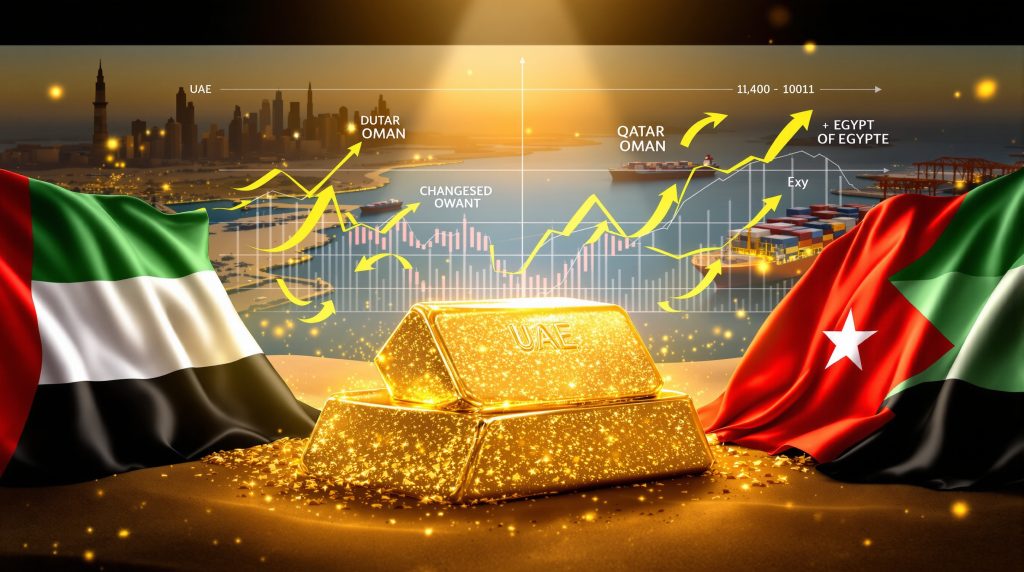How Has the UAE Ban Affected Sudan's Gold Exports?
Understanding the Trade Relationship Before the Ban
The United Arab Emirates has historically been Sudan's primary economic partner, with bilateral trade reaching an impressive $2.2 billion in 2024 according to International Monetary Fund data. Before the implementation of the ban, the UAE functioned as the main destination for Sudan's gold exports, providing a critical economic lifeline for the conflict-affected nation. This vital trade relationship persisted despite diplomatic tensions, continuing even after Sudan officially severed ties with the UAE in June 2025 amid accusations that the Gulf nation was supplying arms to the Rapid Support Forces (RSF).
Timeline and Implementation of the Trade Ban
On August 7, 2025, the UAE imposed a comprehensive uae ban on sudan trade that went beyond direct trade to encompass products in transit from Asian and other Gulf countries. According to internal documentation from Sudan's Transportation Ministry, UAE ports received explicit instructions to reject all cargo destined for or originating from Port Sudan. This directive was confirmed through formal notices issued by major shipping groups including AD Ports Group and CMA CGM SA, who notified their clients and partners of the new restrictions.
Immediate Impact on Gold Exports
Sudanese officials have confirmed that the majority of gold exports to the UAE ceased immediately following the implementation of the ban. This sudden disruption has created substantial challenges for Sudan's economy, as gold represents approximately 40% of the country's exports and serves as a vital source of foreign exchange. The ban effectively closed Sudan's primary gold market, forcing an urgent and strategic pivot toward finding alternative buyers in a challenging geopolitical landscape.
Why Did the UAE Implement the Trade Ban?
Geopolitical Tensions and Civil Conflict
The trade ban follows a period of escalating tensions between Sudan and the UAE against the backdrop of Sudan's ongoing civil war. Although Sudan formally cut diplomatic ties with the UAE in June 2025, accusing it of arming the Rapid Support Forces, economic relationships had continued until the August ban. The UAE has consistently denied allegations of supporting the RSF in the conflict that erupted in April 2023, when power-sharing negotiations between the military and the paramilitary force collapsed.
Strategic Realignment in Regional Politics
The comprehensive nature of the ban signals a significant shift in the UAE's regional strategy, potentially indicating a realignment of its interests in Northeast Africa. By implementing broad trade restrictions, the UAE appears to be leveraging its economic influence as a foreign policy tool, reflecting wider changes in Middle Eastern geopolitical dynamics and potentially repositioning itself among regional powers.
Economic and Security Considerations
Beyond political dimensions, the ban may also reflect growing concerns about conflict-zone resource trade and increasing international scrutiny over financial flows that might indirectly fund armed groups. The gold market trends in particular have attracted global attention regarding transparency, ethical sourcing, and compliance with international regulations—factors that may have influenced the UAE's decision to distance itself from Sudanese gold imports.
What Alternative Markets Is Sudan Pursuing?
Diplomatic Missions to Secure New Gold Buyers
In response to the ban, Sudan's Mining Ministry has launched diplomatic initiatives to several countries seeking alternative markets for its gold exports. Recent delegations have visited Oman and Bahrain to discuss new export arrangements and shipping routes. According to government sources, a preliminary agreement has already been reached with Oman to purchase Sudanese bullion, though specific details of this arrangement remain undisclosed.
The Qatar Connection and Doha Processing Facility
Sudan had already begun establishing groundwork for diversifying its gold export destinations prior to the UAE ban. In 2024, Sudan and Qatar agreed to establish a specialized gold processing facility in Doha specifically designed to handle Sudanese gold exports, as reported by Sudan News Agency. This arrangement has taken on new strategic importance following the UAE ban, with Sudan's Finance Minister Gibril Ibrahim meeting his Qatari counterpart in late August 2025 to accelerate the implementation of this project.
Egypt as a Potential Strategic Partner
Sudan is also exploring deeper mining sector cooperation with Egypt as part of its market diversification strategy. In early September 2025, Sudan's Mining Minister Nour Al-Daem Taha held high-level meetings with his Egyptian counterpart, emphasizing Sudan's desire to "deepen the Sudanese and Egyptian strategic cooperation in the mining sector." This meeting, which included officials from the state-run Sudanese Mineral Resources Company, indicates that Egypt could emerge as another significant alternative market for Sudanese gold.
How Is Sudan Adapting Its Trade Infrastructure?
Restructuring Export Routes and Logistics
The uae ban on sudan trade has forced Sudan to completely reconfigure its export logistics infrastructure. Port Sudan, which serves as the country's primary maritime gateway, now faces the challenge of establishing new shipping connections that entirely bypass UAE ports. This restructuring requires developing new relationships with shipping companies, securing different insurance providers, and negotiating with port authorities in alternative locations across the region.
Developing Alternative Supply Chains
Beyond finding new buyers for its gold, Sudan must develop entirely new supply chains for goods previously sourced from the UAE. According to assessment reports from Sudan's Transportation Ministry, most products that Sudan previously imported from the UAE could potentially be sourced from Qatar and Saudi Arabia, though likely at different cost structures and with adjusted delivery timeframes that may affect various sectors of the economy.
Building New Processing and Certification Systems
To successfully access alternative gold markets, Sudan may need to establish new gold processing, refining, and certification systems that meet the specific requirements and standards of new buyer countries. This infrastructure development represents both a significant challenge and a potential opportunity for modernizing Sudan's mining sector and improving its international market positioning for the longer term.
What Are the Broader Implications for Global Gold Markets?
Shifting Trade Patterns in Middle Eastern Gold Hubs
The redirection of Sudanese gold away from UAE markets could contribute to reshaping regional gold trading patterns. Dubai has long maintained its position as a dominant gold trading hub in the region, but the ban may accelerate the development of alternative centers in Oman, Qatar, and potentially Egypt. This redistribution could alter pricing dynamics, market influence, and trading relationships within the Middle Eastern gold ecosystem.
Impact on Gold Supply Chain Transparency
The disruption may bring increased international attention to gold supply chains from conflict-affected regions. As Sudan seeks new markets, potential buyers may impose stricter due diligence requirements regarding the origin and production conditions of Sudanese gold. While creating short-term challenges, this could potentially improve transparency in the longer term and establish more robust tracking and verification systems for Sudanese gold exports.
Price Implications for Regional Gold Markets
While Sudan's gold output represents a relatively small portion of global production, regional market dynamics could experience short-term price fluctuations as trading patterns adjust to the new reality. The ban may temporarily reduce liquidity in certain market segments as new buyer-seller relationships develop, potentially creating both challenges and opportunities for traders and financial institutions involved in Middle Eastern gold market performance.
How Is the Civil War Affecting Sudan's Gold Sector?
Gold Production Amid Conflict
Despite the ongoing civil war that began in April 2023, Sudan's gold sector has demonstrated remarkable resilience. Production has reportedly increased in some regions, particularly in areas under stable military control. This paradoxical growth amid conflict reflects the strategic importance of gold revenue for financing governmental operations and maintaining economic stability during the crisis.
New Mining Deals and Investment
Sudan's government has continued negotiating and signing new mining agreements despite the conflict, seeking to expand production capacity and secure foreign investment in the sector. These deals aim to modernize extraction methods and increase output, potentially making Sudan's gold sector more attractive to alternative markets despite the challenging security situation and operational difficulties.
Artisanal Mining and Informal Gold Trade
The civil war has also driven growth in informal and artisanal mining activities as communities seek economic survival mechanisms in an increasingly unstable environment. This expansion of small-scale mining presents both opportunities and challenges for Sudan's gold sector, potentially increasing overall output while raising concerns about environmental impact, labor conditions, and the government's ability to regulate and tax production effectively.
What Does This Mean for Sudan's Economic Future?
Economic Diversification Imperatives
The uae ban on sudan trade has starkly highlighted Sudan's dangerous dependence on a single export market. This economic shock may accelerate efforts to diversify both export products and destination markets, potentially strengthening economic resilience in the longer term despite the significant short-term disruption. Policymakers are likely to prioritize reducing economic vulnerabilities by developing multiple trading partners and revenue streams.
Fiscal Implications and Government Revenue
Gold exports represent a crucial source of government revenue and foreign exchange for Sudan. The disruption of these exports, even temporarily, creates significant fiscal challenges for a government already struggling with economic crisis and the costs of civil war. The success of efforts to find alternative markets will directly impact Sudan's ability to finance essential services, pay public sector salaries, and fund military operations in the ongoing conflict.
International Financial Relations
Sudan's search for new gold markets occurs against a backdrop of complex international financial relations. The country's debt situation, sanctions history, and ongoing conflict complicate its engagement with global financial institutions and potential trading partners. Gold exports represent one of the few available channels for accessing international markets and obtaining hard currency, making the successful redirection of these exports critically important for economic stability.
FAQs About the UAE-Sudan Trade Ban
Why is gold so important to Sudan's economy?
Gold has become Sudan's primary export commodity following the loss of substantial oil revenue after South Sudan's independence in 2011. The precious metal accounts for approximately 40% of Sudan's exports and serves as a critical source of foreign currency in an economy struggling with persistent inflation and currency depreciation. Gold mining also provides employment for thousands of Sudanese citizens, making it both economically and socially significant.
Could the UAE ban be lifted in the near future?
The ban appears to be tied to deeper geopolitical tensions rather than temporary trade disputes, suggesting it may remain in place until there's significant political resolution in Sudan or a major shift in UAE foreign policy priorities. No formal conditions for lifting the ban have been publicly stated by UAE authorities, making the timeline for any potential normalization of trade relations highly uncertain.
How might this affect global gold prices?
While Sudan's gold output is significant regionally, it represents a relatively small portion of global production. Therefore, the direct impact on global gold prices analysis will likely be minimal, though regional pricing and premiums may adjust as new trading patterns emerge. Local market dynamics in the Middle East may see more pronounced effects as supply chains reorganize around the ban.
What challenges do alternative markets face in purchasing Sudanese gold?
Alternative buyers must navigate several challenges, including compliance with international regulations regarding conflict minerals, establishing new logistics chains, and potentially developing refining capacity suitable for processing Sudanese gold. They may also face diplomatic pressure depending on their relationships with the UAE and other stakeholders in the Sudan conflict, requiring careful balancing of economic and political considerations.
How is the conflict affecting control of gold mining regions?
The civil war has resulted in shifting territorial control across Sudan, with some gold-rich regions changing hands between government forces and the RSF. This dynamic creates additional complexity for production consistency and export arrangements, as mining operations may be disrupted by fighting or face multiple taxation demands from different armed groups controlling transportation routes. The security situation in mining areas remains fluid and unpredictable.
Further Exploration
Readers interested in learning more about the dynamics of gold trading in the Middle East and North Africa region can explore related educational content from various financial and mining industry publications, which offer ongoing coverage of record-breaking gold prices and regional trade developments. Understanding the interconnection between resource economics and regional conflicts provides valuable context for following developments in Sudan's evolving gold export situation, including the latest gold price forecast.
Looking for the Next Major Gold Discovery?
Discover high-potential ASX gold opportunities before the market catches on, with Discovery Alert's proprietary Discovery IQ model that instantly identifies significant discoveries across the sector. Explore historic returns from previous major gold discoveries at https://discoveryalert.com.au/discoveries/ and position yourself ahead of other investors.




